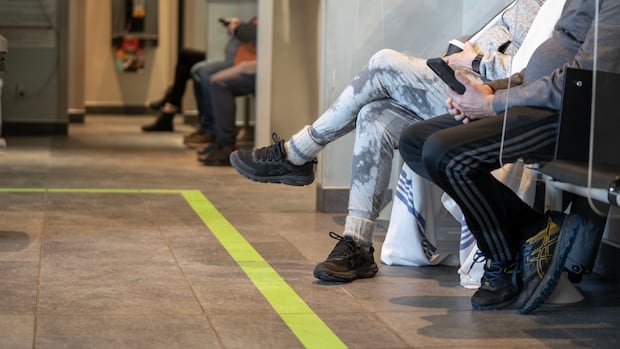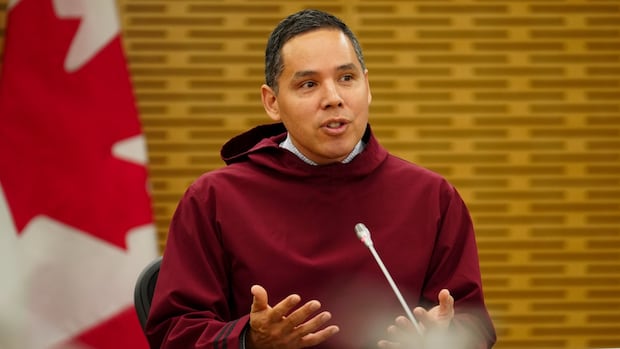A new report on the number of patients leaving emergency rooms before receiving treatment is underscoring ongoing concerns about the state of the province's hospitals.
Last year, nearly 430,000 patients in Quebec left the ER before they received care, according to a report released by the Montreal Economic Institute on Thursday.
That number represents just over 11 per cent of all Quebecers who visited an ER that year in the province — a proportion that's significantly higher than the national average of about seven per cent, according to the think tank.
The data comes from access to information requests filed with the health departments across the country, says Renaud Brossard, vice-president of communications at the Montreal Economic Institute.
"Some provinces are getting worse faster, but Quebec is still amongst the worst performing," he said.
"There's people who for one reason or another, cannot spend five, six, seven hours waiting in the ER to see a doctor."
People leaving don't always have 'benign conditions'Dr. Judy Morris, an ER physician in Montreal and former president of the association of emergency physicians in Quebec, says seeing these numbers "creeping up" means staff cannot adequately answer the need.
"What's scary to us … is that we know that the people that walk out are not always the people that have benign conditions," she said.
"Sometimes people apologize to us. They say, 'I'm so sorry I came to the emergency room. I know you're busy,' but sometimes patients are not necessarily the best to know what's good for them."
She says this situation continues to be concerning, but there's no "silver bullet."
ER resources are a key contributing factor, says Dr Gilbert Boucher, an ER doctor at the Montreal Heart Institute and president of the association of emergency room specialists in Quebec.
 Dr. Gilbert Boucher, president of the association of emergency room specialists in Quebec, says quite a few patients return to the ER when they leave without being seen. (Radio-Canada)
Dr. Gilbert Boucher, president of the association of emergency room specialists in Quebec, says quite a few patients return to the ER when they leave without being seen. (Radio-Canada)He says "the pressure keeps increasing" — with doctors feeling the impact of budget restraints "all the time."
"We know basically how many patients are going to show up in the emergency every day … and we know we need that amount of doctors, that amount of nurses," said Boucher.
"Then we show up and those people are not there."
18% of people return in 48 hours, Santé Québec saysWithout the proper team, he says all staff can do is care for the next patient.
"It's not fun for anybody. It's a bit demoralizing actually knowing that we're not able to care for everybody," said Boucher.
What's more, a significant proportion of patients who end up leaving will have to return, he says.
 An evaluation and triage area in a Quebec hospital pictured in 2024. On the ground, Dr. Boucher says many patients still need emergency treatment when they leave the ER. (Yoann Dénécé/Radio-Canada)
An evaluation and triage area in a Quebec hospital pictured in 2024. On the ground, Dr. Boucher says many patients still need emergency treatment when they leave the ER. (Yoann Dénécé/Radio-Canada)"They come back a day or two later and they are worse off," said Boucher.
"A little urinary tract infection if you don't treat it … with a simple pill it ends up being a three-day hospitalization with IV antibiotics."
He says he saw a patient come in five days after a heart attack. She told him she "didn't want to disturb" and "didn't want to wait for a long time," he says.
In an emailed statement, Santé Québec confirmed 18 per cent of people who leave before being treated return to the ER within 48 hours.
It pointed to the increasing and aging population as part of the cause for longer delays.
'They're not sick, sick, but they cannot go home'Santé Quebec says it is currently working on ways to reduce emergency room treatment times but that since April, patients have already been spending less time waiting. It says the average wait time is two hours and 46 minutes — a reduction of 12 minutes compared to the year prior.
Between 2024 and 2025, it says 70 per cent of those who left before being treated were classified as priority four or five — cases deemed less urgent or non-urgent on the triage scale.
But on the ground, Boucher says many of those patients still need emergency treatment, saying only about 20 to 25 per cent of them should be going elsewhere to seek care.
 At the end of 2023, Quebec Health Minister Christian Dubé asked Quebecers to stay away from ERs if possible, saying unnecessary emergency department visits significantly contribute to overcrowding. (Ivanoh Demers/Radio-Canada)
At the end of 2023, Quebec Health Minister Christian Dubé asked Quebecers to stay away from ERs if possible, saying unnecessary emergency department visits significantly contribute to overcrowding. (Ivanoh Demers/Radio-Canada)"They're not sick, sick, but they cannot go home," he said.
He acknowledges it can be difficult to decide when to seek out medical care in the hospital, but says concerning symptoms include chest pain, shortness of breath, vomiting and a fast heart rate.
The emergency room is often the way to enter the health-care system for people who don't have access to the internet and who cannot navigate English or French online systems, he says.
"We cannot tell people not to come to the emergency department because that's a message for disaster," he said.
At the end of 2023, Quebec Health Minister Christian Dubé asked Quebecers to stay away from ERs if possible to reduce the pressure on emergency rooms.
At the time, the Canadian Association of Emergency Physicians said it found these comments concerning — adding that if patients feel they need emergency health care, they shouldn't hesitate.
When asked about the Montreal Economic Institute's findings in the National Assembly Thursday, Dubé said it's "even more reason for an agreement," referring to ongoing tensions between the Quebec government and some medical groups over the remuneration scheme proposed by the provincial government in Bill 106.













